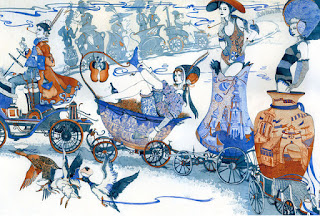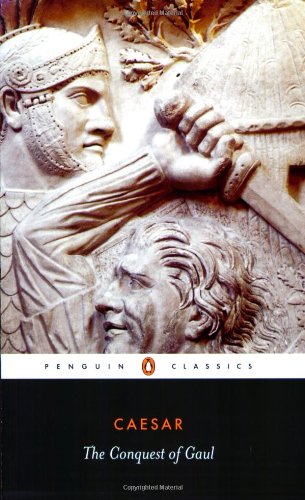 Having recently read Arthur Clarke's The City and the Stars, I can't help but reflect on the strangeness of the world Clarke lets us inhabit in his books. Isn't it always a world on the verge of a great discovery? I'm thinking not only of this book, but also works like, say, Rama or 2001: A Space Odyssey. There's a sweet and thrilling sense of possibility that the universe just might take us on a fantastic voyage towards previously unimaginable power and knowledge, a sense of humanity just being about to pass a threshold that will unlock some marvellous evolution or possibility of limitless expanse. What we have here, I think, is a very peculiar atmosphere, one that needs to be understood in the context of the lingering belief in progress characteristic of the 20th century before the onset of postmodernism. At the same time, this is no ordinary trust in progress. It is, I would say, distinguished by two peculiarities that probably also need to be understood historically.
Having recently read Arthur Clarke's The City and the Stars, I can't help but reflect on the strangeness of the world Clarke lets us inhabit in his books. Isn't it always a world on the verge of a great discovery? I'm thinking not only of this book, but also works like, say, Rama or 2001: A Space Odyssey. There's a sweet and thrilling sense of possibility that the universe just might take us on a fantastic voyage towards previously unimaginable power and knowledge, a sense of humanity just being about to pass a threshold that will unlock some marvellous evolution or possibility of limitless expanse. What we have here, I think, is a very peculiar atmosphere, one that needs to be understood in the context of the lingering belief in progress characteristic of the 20th century before the onset of postmodernism. At the same time, this is no ordinary trust in progress. It is, I would say, distinguished by two peculiarities that probably also need to be understood historically.Firstly, another "strange" trait of Clarke's universe is that it lacks conflict. There are protagonists but not really any antagonists. HAL in 2001 might be terrifying, but is just a dysfunctioning machine with no malicious purpose. In the end it proves to be but a minor stumbling block on Bowman's triumphant evolutionary journey. Alien intelligences are never hostile. If anything, they are benevolent and ready to guide humanity to greater evolutionary heights. To evolve, however, human beings need to overcome their limitations in the form of superstitions and fears. If we just venture forth with courage, we'll discover how unfounded our fears are. In The City and the Stars, the protagonist Alvin discovers that the “invaders” are a myth, a false memory hindering humankind from venturing outside their isolation on earth and used to justify their fear of the universe. In 2001 humankind even gets the paternalistic guidance of these higher beings to steer itself onwards in evolution. What's so peculiar here is that Clarke's narrative, despite the absence of antagonists, still works as literature. Even without conflict, he somehow manages to make the reader want to go on reading.
Secondly, these books all circle around what can be termed the problem of unbalanced progress. Crudely put, it goes like this: while humanity has made enormous technological progress, it still lags behind morally and spiritually. This has resulted in the horrors of totalitarianism and the world wars and the madness of the cold war, and to survive on this planet we need to achieve spiritual development to restore balance. This is a lament that was very much in the air in the mid-20th century. It may very well have been the dominant idiom in which the criticism of technology was expressed in the decades before the onset of postmodernism. It seems to pop up almost simultaneously in a series of writers from the Frankfurt School to Lewis Mumford. In science fiction, we can see it in Isaac Asimov's Foundation novels, where the "first" foundation with its technological mastery needs to unite with the mysterious and psychologically advanced "second" foundation in order to end the centuries of barbary. Unbalanced progress is also a dominant motif in Clarke. It is powerfully present in 2001, which quite explicitly presents a philosophy of history organized around humanity's two successive evolutionary leaps - each one triggered by a black monolith left behind by benevolent aliens - the fist of which triggers technological progress and second of which triggers a kind of spiritual evolution. In The City and the Stars, humanity only exists on two spots on earth: on the one hand the technologically superior Diaspar which is ruled by a computer and on the other hand the low-tech but spiritually evolved Lys where human beings communicate telepathically. The role of Alvin, the protagonist, is to be the mediator who brings them together.
Now, I'm going to leave this motif of unbalanced progress aside - I think it's quite evident in what ways it is rooted in a particular historical moment - and return to the curious lack of antagonism in Clarke's books. Combined with the belief in progress and the strange benevolence of aliens this yields what is easy to criticize as a highly ideological world view. What we see here is in fact the very same kind of ideology that imperialism used to justify itself. Imperialism has always described itself as benevolent, as bringing the blessings of a superior civilization to primitive peoples, as in fact lacking antagonism. In a way, the aliens of Clarke's 2001 and to a great extent also the extra-terrestrial empire of The City and Stars behaves exactly like the imperialist powers did according to their own ideological self-description. They didn't oppress or exploit anyone, they simply shared knowledge and guided those willing to learn onwards. In the same way, oppression and exploitation are missing in Clarke's universe. To use Karl Wittfogel's categories, we might say that the earth's position in relation to the advanced alien civilizations is like that of a "submargin" rather than a "margin". According to Wittfogel, the margin was the barbarous borderland of the empire and was often politically dominated by the latter, while the submargin was beyond the reach of the empire's might but still close enough to receive small glimpses of its civilization and learn from it if it chose to do so. In Clarke's novels, the earth is clearly a submargin - almost always a backwater, seemingly to insignificant for alien civilizations to actually bother much about.
What I'm suggesting here is that Clarke's novels - with their conspicuous foregrounding of the idea of progress and their strange lack of conflict - present us with a reconfiguration of motifs familiar to readers through the experience of imperialism. On the one hand, his novels assume the position of the imperialist: the air of being on the cusp of great discoveries, the sense of adventure and the drive to explore - all of this can well be read as an attempt to evoke the sense of wonder and novelty believed to have animated European colonialist ventures and conquests in early modernity. But on the other hand, it is as if Clarke cannot quite allow himself to affirm this ethos. After all, imperialism is bad, a continuation of the lopsided and catastrophic kind of progress we've seen in modernity so far. And so he effects a replacement: what awaits us out there among the stars is not primitive peoples for us to enslave and exploit, but - on the contrary - higher beings, far more wise and powerful than we, who can help us evolve further in a better and more balanced way, and with this latter move, he paradoxically places us in the position, not of the conquering imperialist, but of the primitives gazing with wonder and awe at the imperial civilization and learning to take its first tottering steps on the road of genuine progress.
Naturally, the motif of the empire is also central to Asimov, and I suppose an interesting comparison could be made here between him and Clarke, but I think I'll stop here. The point I want to make is simply that there seems to be a cluster of motifs related to empire, technology and unbalanced progress that recurs in much of the science fiction of the early postwar decades and that - perhaps - feels somewhat unfamiliar and strange to readers today.















